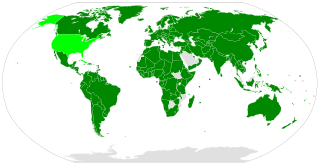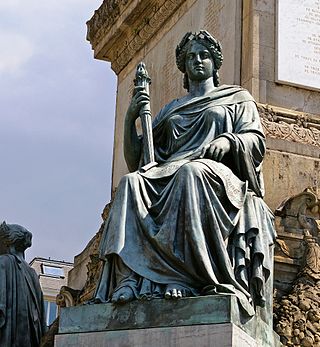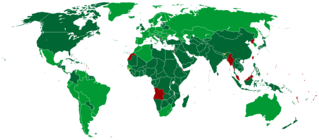
Discrimination is the act of making unfair or prejudicial distinctions between people based on the groups, classes, or other categories to which they belong or are perceived to belong, such as race, gender, age, or sexual orientation. Discrimination especially occurs when individuals or groups are unfairly treated in a way which is worse than other people are treated, on the basis of their actual or perceived membership in certain groups or social categories. It involves restricting members of one group from opportunities or privileges that are available to members of another group.

The European Convention on Human Rights is an international convention to protect human rights and political freedoms in Europe. Drafted in 1950 by the then newly formed Council of Europe, the convention entered into force on 3 September 1953. All Council of Europe member states are party to the convention and new members are expected to ratify the convention at the earliest opportunity.

Cultural genocide is a concept which was proposed by lawyer Raphael Lemkin in 1944 as a component of genocide. Though the precise definition of cultural genocide remains contested, the Armenian Genocide Museum defines it as "acts and measures undertaken to destroy nations' or ethnic groups' culture through spiritual, national, and cultural destruction".

The International Covenant on Civil and Political Rights (ICCPR) is a multilateral treaty that commits nations to respect the civil and political rights of individuals, including the right to life, freedom of religion, freedom of speech, freedom of assembly, electoral rights and rights to due process and a fair trial. It was adopted by United Nations General Assembly Resolution 2200A (XXI) on 16 December 1966 and entered into force on 23 March 1976 after its thirty-fifth ratification or accession. As of June 2022, the Covenant has 173 parties and six more signatories without ratification, most notably the People's Republic of China and Cuba; North Korea is the only state that has tried to withdraw.

The International Covenant on Economic, Social and Cultural Rights (ICESCR) is a multilateral treaty adopted by the United Nations General Assembly (GA) on 16 December 1966 through GA. Resolution 2200A (XXI), and came in force from 3 January 1976. It commits its parties to work toward the granting of economic, social, and cultural rights (ESCR) to the Non-Self-Governing and Trust Territories and individuals, including labour rights and the right to health, the right to education, and the right to an adequate standard of living. As of July 2020, the Covenant has 171 parties. A further four countries, including the United States, have signed but not ratified the Covenant.

The Convention on the Elimination of all Forms of Discrimination Against Women (CEDAW) is an international treaty adopted in 1979 by the United Nations General Assembly. Described as an international bill of rights for women, it was instituted on 3 September 1981 and has been ratified by 189 states. Over fifty countries that have ratified the Convention have done so subject to certain declarations, reservations, and objections, including 38 countries who rejected the enforcement article 29, which addresses means of settlement for disputes concerning the interpretation or application of the convention. Australia's declaration noted the limitations on central government power resulting from its federal constitutional system. The United States and Palau have signed, but not ratified the treaty. The Holy See, Iran, Somalia, Sudan, and Tonga are not signatories to CEDAW.
Economic, social and cultural rights (ESCR) are socio-economic human rights, such as the right to education, right to housing, right to an adequate standard of living, right to health, victims' rights and the right to science and culture. Economic, social and cultural rights are recognised and protected in international and regional human rights instruments. Member states have a legal obligation to respect, protect and fulfil economic, social and cultural rights and are expected to take "progressive action" towards their fulfilment.

Japan is a constitutional monarchy. According to Ministry of Justice (MOJ) figures, the Japanese Legal Affairs Bureau offices and civil liberties volunteers dealt with 359,971 human rights related complaints and 18,786 reports of suspected human rights violations during 2003. Many of these cases were ultimately resolved in the court. Human rights issues occur in present-day Japan, as modernization history of Japan only reached in the non-humanity areas with the rise of military expansion of Empire of Japan in the 20th century.

Freedom of education is the right for parents to have their children educated in accordance with their religious and other views, allowing groups to be able to educate children without being impeded by the nation state.

The right to education has been recognized as a human right in a number of international conventions, including the International Covenant on Economic, Social and Cultural Rights which recognizes a right to free, primary education for all, an obligation to develop secondary education accessible to all with the progressive introduction of free secondary education, as well as an obligation to develop equitable access to higher education, ideally by the progressive introduction of free higher education. In 2021, 171 states were parties to the Covenant.
Linguistic rights are the human and civil rights concerning the individual and collective right to choose the language or languages for communication in a private or public atmosphere. Other parameters for analyzing linguistic rights include the degree of territoriality, amount of positivity, orientation in terms of assimilation or maintenance, and overtness.
The Convention for the Protection of Human Rights and Dignity of the Human Being with regard to the Application of Biology and Medicine, otherwise known as the European Convention on Bioethics or the European Bioethics Convention, is an international instrument aiming to prohibit the misuse of innovations in biomedicine and to protect human dignity. The Convention was opened for signature on 4 April 1997 in Oviedo, Spain and is thus otherwise known as the Oviedo Convention. The International treaty is a manifestation of the effort on the part of the Council of Europe to keep pace with developments in the field of biomedicine; it is notably the first multilateral binding instrument entirely devoted to biolaw. The Convention entered into force on 1 December 1999.

The Convention on the Rights of Persons with Disabilities is an international human rights treaty of the United Nations intended to protect the rights and dignity of persons with disabilities. Parties to the convention are required to promote, protect, and ensure the full enjoyment of human rights by persons with disabilities and ensure that persons with disabilities enjoy full equality under the law. The Convention serves as a major catalyst in the global disability rights movement enabling a shift from viewing persons with disabilities as objects of charity, medical treatment and social protection towards viewing them as full and equal members of society, with human rights. The convention was the first U.N. human rights treaty of the twenty-first century.
The Belgian Linguistic case (1968) 1 EHRR 252 is a formative case on the right to education under the European Convention of Human Rights, Protocol 1, art 2. It related to "certain aspects of the laws on the use of languages in education in Belgium", was decided by the European Court of Human Rights in 1968.
The Declaration of Human Duties and Responsibilities (DHDR) was written for reinforcing the implementation of human rights under the auspices of the UNESCO and the interest of the Office of the United Nations High Commissioner for Human Rights and was proclaimed in 1998 "to commemorate the 50th anniversary of the Universal Declaration of Human Rights"(UDHR) in the city of Valencia. Therefore, it is also known as the Valencia Declaration.

Historically speaking, lesbian, gay, bisexual, and transgender (LGBT) people have not been given equal treatment and rights by both governmental actions and society's general opinion. Much of the intolerance for LGBT individuals come from lack of education around the LGBT community, and contributes to the stigma that results in same-sex marriage being legal in few countries (31) and persistence of discrimination, such as in the workplace.

The International Convention on the Elimination of All Forms of Racial Discrimination (ICERD) is a United Nations convention. A third-generation human rights instrument, the Convention commits its members to the elimination of racial discrimination and the promotion of understanding among all races. The Convention also requires its parties to criminalize hate speech and criminalize membership in racist organizations.
Article 15 of the Constitution of India forbids discrimination on grounds only of religion, race, caste, gender, or place of birth. It applies Article 14's general principle of equality in specific situations by forbidding classifications made on protected grounds. While prohibiting discrimination based on prejudice, the Article is also the central issue in a large body of judicial decisions, public debate, and legislation revolving around affirmative action, reservations, and quotas. As of the 103rd Amendment of the Constitution of India, Article 15.
Article 14 of the European Convention on Human Rights lists the prohibited grounds against which discrimination in illegal. The text states that
"The enjoyment of the rights and freedoms set forth in [the] Convention shall be secured without discrimination on any ground such as sex, race, colour, language, religion, political or other opinion, national or social origin, association with a national minority, property, birth or other status."











